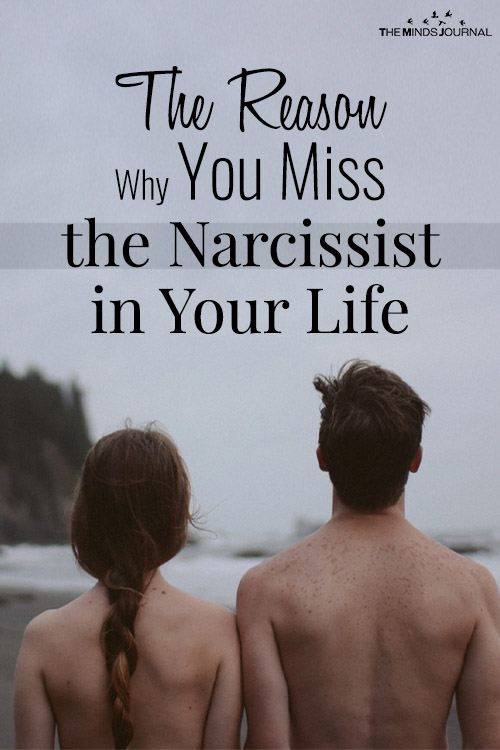The psychology behind missing a narcissist in your life
What I have learned from my own experience of being in a relationship with a narcissist for 2 years is that, after everything ends, you feel lost, broken and completely unrecognizable. You fail to identify the cheerful, lively individual who you used to be. The narcissist has twisted every frailty in you and has brought about a modification in your personality.
The person who once used to trust others, has been rendered to be a person who can no longer confide in the intentions of another human being, a person who has lost faith in oneself and in the world.
A narcissist can, in months, toss your life upside down, leaving you behind searching for answers.
The mistake most of us make here is to urge for the narcissist to provide you with a closure.
Remember, the narcissist was never emotionally involved with you in the first place. All they sought after was a person who can selflessly sacrifice their innate needs and prioritize the narcissist’s need for fulfillment. And once you have done that you will be reduced to a useless mass of flesh to be done away with.
To begin with, if you are on the healing process after a narcissistic abuse, just hold on, you will finally find answers to your questions – not with the narcissist but with yourself. Once you fully regain self-control, your resilience is worth glorifying.
The narcissist’s memories have been so ingrained in you, you find it almost impossible to function independently without this person. It’s natural to reel back to their memories or emerge yourself in their thoughts. Sometimes this is inevitable, especially after how much you have invested emotionally, psychologically and physically on them.
You and I both know that it is often emotionally destructible to keep longing for the person who completely demolished you, from time to time. Nevertheless, it is in fact, it is one of the inescapable phases of surviving a narcissistic abuse.
Love bombing is a marked behavior displayed by a narcissist during the initiation of a romantic relationship.
It is a common pattern of relational interaction by a narcissist to lay a foundation for future abuse to pervade. It serves as the foundation on which the trauma bond is being built.
The act of ‘love-bombing’ literally describes, how a narcissist ‘bombs’ his/her significant other with the presence of excessive communication, love, affection, protection, and everything positive at the beginning of a relationship to establish and secure control and power over the other person’s life.
At this stage of the relationship, the narcissist has a high tendency to significantly increase the amount of communication via social media, texts, emails and phone calls. This overbearing amount of attention, flattery, and praise might be overwhelming or even sometimes debilitating for the significant other.
This encompasses the idealization phase of the toxic cycle that the narcissist has already ensnared you into.
Love-bombing has the most substantial effect on you because it ensures that your basic needs are fulfilled: need for approval, need for love, belongingness and also the need to feel exclusive in the eyes of one’s partner. This invariably creates an illusion of the ‘ideal partner’.
To you, your partner becomes the best possible person on earth, your perfect fit, the ‘one you waited for your entire life’. This ‘image’ you create about your partner is not based on their ‘real self’ it’s based on the ‘masked self’ they portray before you. The narcissist is ultimately ‘manufacturing the positive appraisals’ about oneself in you, in hopes of getting it back in return, in the form of praise.
The love-bombs act as a mirror to your deepest desires of being accepted wanted and be seen. This is exactly what the narcissist in your life provides you within the beginning of the romantic relationship. Once the idealization phase is over, the devaluation phase readily begins with immediate effect, once you have returned their praise and it has been consummated. But what you get stuck to, is the amount of ‘positive experiences’ that they made you go through. .
The narcissist’s trap gets more obnoxious when you are left perplexed as to why this person who showered you with utmost love and affection, dedicated time to you, made efforts to make you feel special, praised and complimented you, made you feel complete has suddenly turned into an individual criticizing, complaining, blaming and belittling you. Intermittent reinforcement on the part of the abuser will still keep you sticking to the narcissist, seeking for the periodical scraps of positive behavior they feed the victim.
It is natural to desperately wish your partner to return back to the honeymoon phase of the relationship.
This is the exact turn where you slowly feel like you are losing grip on yourself. High chances are there that you will happen to view your positive experience in an amplified manner as compared to the sporadic span of neglect and ill-treatment.
Your only option now is to stoop down lower, beg, negotiate, lose your self-respect just to get a glimpse of that ‘ideal partner’ you had once witnessed.
No doubt, all of your ardent requests will be left unheard. They either keep treating you in an increasingly negligent manner or will completely cut contacts with you after they have successfully broken your self-confidence and distorted your self-image.
Once the relationship is over, grieving has to take place. Healing the wounds inflicted by the narcissist will naturally be difficult. Not only for you, but it is also hard for anyone to erase the ‘good memories’ all at once and forget the narcissist. What you miss and long for is not the real person you lost, it the facade they had put over themselves, the stories they told, the feelings they made you go through. But this does not make your pain any less valid.
Often times, the dissolution of a romantic relationship will happen from your end when all of your efforts to earn the narcissist back will fail. The separation happens too quick and unexplained. This lack of a proper closure can arouse curiosity and can intensify your feelings of longing for the narcissist.
The termination of the relationship can feel like the end of the world, can make you feel lonely, worthless, invalidated and even make you feel like giving up on life.
It is absolutely fine to feel like giving up. But remember, you have another option of not letting this relationship define you. Give yourself the opportunity to know that you are capable beyond just an intimate bond, you are worthy, you have the chance to begin a new life.
Just like the good memories of your partner is keeping you moving back to his/her thoughts, similarly, the moments of profound pain they made you go through can help you justify your need to reclaim yourself.
Remember all the poison words they spit at you, the times they disrespected you, isolated you, betrayed you, lied to you, criticised you, blamed you for things you never did.
With time, you will get to see the nights you wished they wiped your tears, but they didn’t, the moments you wish they hugged you but didn’t, moments you realised they were playing with your fragile emotions.
You will slowly witness your negative experiences with them overshadow the positive.
If you are crying today for they left, remember, tomorrow you will cry a little less, for the very same reason.
All you need to know is that the good experiences with a narcissist must not be a justification to continue staying in the abusive cycle.
Remember, You are not broken and in need of fixing. You are wounded and in need of healing. ― Danu Morrigan
You May Also Like:
- Narcissist Mirroring: How Narcissist Manipulates You Into Loving Them
- Narcissistic Relationships
- The Narcissist’s Soulmate Scam: Identifying a Love Bomber
- 4 Traits of A Narcissist Magnet. Are You One?
- Love Bombing as a Narcissistic Attachment Style
- 4 Ways You Can Unintentionally Fall In Love With A Narcissist









Leave a Reply
You must be logged in to post a comment.